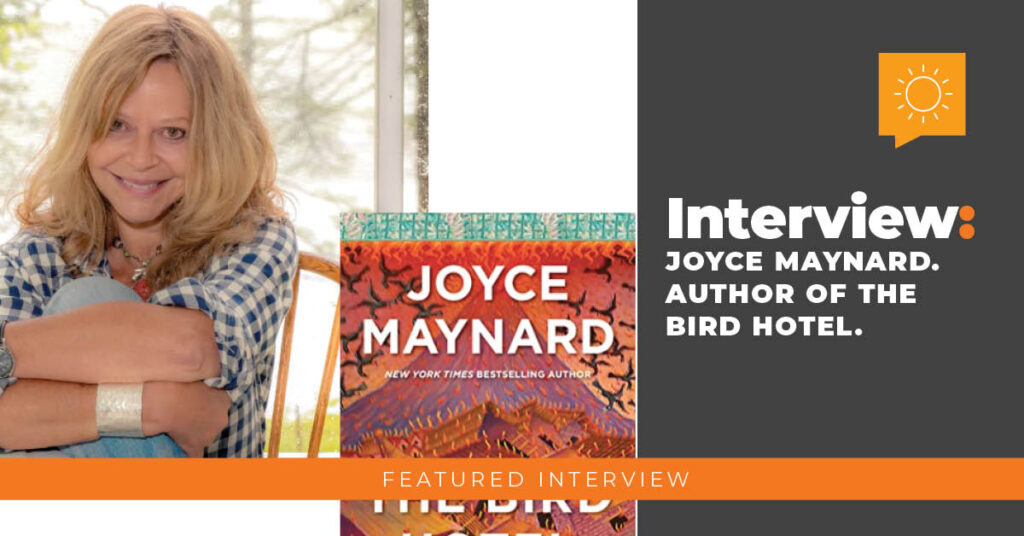
BY MICHELE MATHEWS
Released in May, The Bird Hotel is Joyce Maynard’s newest novel. Her career has spanned over 50 years, starting when she was in her teens. I wanted to learn more about her long writing career so I asked her a few questions about it as well as The Bird Hotel.
At 13, you were publishing your stories in magazines, and at 18, you gained national attention in the New York Times with your cover story called “An Eighteen Year Old Looks Back on Life.” Share your thoughts about being published at a young age.
JM: It was a pretty intoxicating experience, at 18, to find myself on the cover of a major magazine, and sought out by editors and publishers. Looking back now, I recognize what I could not have understood at the time: that a young writer would do best to develop her talent slowly, not under the gaze of so much public scrutiny.
Your career has spanned over 50 years. What are two or three highlights that stand out the most to you?
JM: THREE? Oh boy. Here goes. One would be writing my first novel—Baby Love. Not the publishing part. I’m talking about the sheer joy of discovering that I could write a novel, and losing myself so utterly in that story (I was 26 at the time) that I lost all sense of time. Until then, the stories I told were all about things that actually happened to me. The experience of writing fiction—telling a story that came from my imagination—set me on fire.
Next I’ll choose the moment–age 43 now—when I gave myself permission to tell a story I’d kept secret for 25 years, concerning what happened to me when I was 18 years old. I’m speaking of my relationship with J.D. Salinger, who wrote me a letter (many letters, eventually) and encouraged me to leave college and move in with him. Forbidden by him to ever speak of this, after he dismissed me from his life a year later, I had never spoken of Salinger. Then, when my oldest child—my daughter, Audrey—turned 18, I suddenly saw what had taken place through a completely different lens and gave myself permission to tell my story. That became my memoir, At Home in the World.
The consequences of publishing that book were vast and devastating. In the pre-Me Too world, I was almost universally condemned for revealing an aspect of a great author’s life that didn’t support the narrative around him. The cost to my career was high. But I have never regretted telling that story. And in the years since the publication of At Home in the World, I’ve heard from hundreds of women who were helped by that story.
Number three: I think that would be the years I got to write my syndicated newspaper column, Domestic Affairs, about my life and the life of my family when my children were small. I loved how that column connected me with women all around the country, raising children, carrying on in their marriages, and trying at the same time to be true to themselves.
You’ve had two of your books, To Die For and Labor Day, adapted for film. For Labor Day, you taught actors, Josh Brolin and Kate Winslet, how to bake a pie. What was that experience like?
JM: Oh, you know…Teaching an utterly irresistible movie star how to make a pie is kind of so-so….
Just kidding. I loved Josh. And I loved it that he really cared about making that pie well (and learned how to do it). The scene in Labor Day where Josh makes peach pie has to be the sexiest pie scene in film history.
One of your most recent novels, Count the Ways, won the Grand Prix Literaire Award in France. How did you feel when you found out you had won this prestigious award?
JM: That was a hugely gratifying moment, of course. I’ll be honest, here. As many years have passed since I published At Home in the World, and as many novels as I’ve published since then, in my own country, I am still identified, way too often, as “that writer who slept with Salinger.” It was in a whole different country, on the other side of the ocean, that I first felt I’d been truly respected as a writer.
In your newest release, The Bird Hotel, the main character Irene travels to Central America and assimilates into the culture. What research did you do to make sure the novel showed the authenticity of the culture?
JM: No research was necessary. I’ve spent a significant portion of my time in Guatemala, where I have a house, for the last 23 years. The country in which I set The Bird Hotel is a fictional one, but I know enough about life in a small Mayan indigenous village on a lake—overlooking a volcano—that I felt very comfortable in that territory.
La Llorona, the setting of The Bird Hotel, sounds a bit like your own home, Casa Paloma. Where do you get your inspiration for the settings in your novels?
JM: One of the great gifts of my life has been the relationships I’ve formed with women who read my books and attend the memoir writing workshops I’ve hosted—in Guatemala and elsewhere—for over 25 years now. I carry with me the stories hundreds of women have entrusted to me. I don’t divulge anyone’s secrets or appropriate their experiences. But my greatest education has come from women who tell me their stories.
What was your favorite part about writing The Bird Hotel?
JM: Without giving anything away, I’ll just say it has to do with a moment in which my central character—a woman who has lived on the shores of a vast and beautiful lake for many years, but is terrified of swimming—finds herself compelled to dive in and the reason why she does it.
Are you currently working on a new book? If so, could you share a bit about it and its release date?
JM: I just finished writing the sequel to my novel, Count the Ways—titled How the Light Gets In. That one will come out next year. I can’t wait to share this next part of the story with the readers who keep writing to say they’re longing to know what happens next.

The Bird Hotel
After a childhood filled with heartbreak, Irene, a talented artist, finds herself in a small Central American village where she checks into a beautiful but decaying lakefront hotel called La Llorona at the base of a volcano. The Bird Hotel tells the story of this young American who, after suffering tragedy, restores and runs La Llorona. Along the way we meet a rich assortment of characters who live in the village or come to stay at the hotel. With a mystery at its center and filled with warmth, drama, romance, humor, pop culture, and a little magical realism, The Bird Hotel has all the hallmarks of a Joyce Maynard novel that have made her a leading voice of her generation.

Continue Reading…
Article originally Published in the June / July / August 2023 Issue: Summer Reads.
